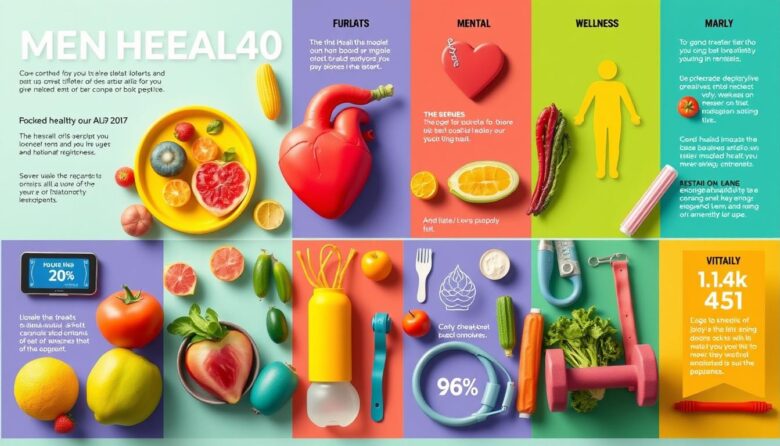Men over 40 face special challenges and chances. This guide covers health, relationships, career, and lifestyle. We’ll talk about important health checks, staying fit, mental health, money planning, and relationships.
Our aim is to give you science-backed tips for a healthy life. We want you to feel confident and full of energy in your middle years.
The path to aging well is both tough and full of chances. If you’re looking for health facts men over 40 should know, or tips for wellness and aging well, we’ve got you. We’ll share key health checks, mental health tips, and more to help you shine in your middle years.
Essential Health Screenings and Medical Checkups for Men Over 40
As men hit their 40s, staying healthy is more important than ever. Regular health checks help find problems early and prevent them. Here are key health tests every man over 40 should get:
Regular Physical Examinations
Annual physicals are key to staying healthy. They let doctors check your overall health and find hidden issues. Your doctor will check your blood pressure, look over your health history, and run tests to make sure you’re okay.
Prostate Health Monitoring
Prostate cancer is common in American men, with 1 in 9 getting it. Regular checks, like digital exams and PSA tests, help find it early. Men 55 to 69 should talk to their doctors about these tests.
Cardiovascular Assessments
Heart health is a big deal in the 40s. You’ll need regular blood pressure and cholesterol checks. The American Heart Association says men should get their blood pressure checked every two years, more often if it’s high.
| Health Screening | Recommended Frequency |
|---|---|
| Blood Pressure Check | At least once a year |
| Cholesterol Screening | Every 5 years for those with normal levels |
| Colorectal Cancer Screening | Starting at age 45, with various screening options |
| Prediabetes and Type 2 Diabetes Screening | Starting at age 35 |
| Eye Exam | Every 2-4 years for ages 40-54, every 1-3 years for ages 55-64 |
| Lung Cancer Screening | Annual LDCT scan for men aged 50-80 with a 20 pack-year smoking history |
By focusing on these health screenings, men over 40 can stay healthy and catch problems early. Remember, regular check-ups are the secret to a long, healthy life.
Understanding Body Changes and Hormonal Shifts
Men in their 40s and beyond face big changes in their bodies and hormones. These changes affect their health and well-being. It’s important for men over 40 to understand these changes to stay healthy.
One big change is the drop in testosterone levels. On average, testosterone levels fall by about 1% each year after 40. Even though only 10% to 25% of older men have low testosterone, many don’t notice or treat it. Symptoms include less sex drive, trouble getting an erection, breast discomfort, and trouble getting pregnant.
Men also see changes in other hormones like growth hormone, cortisol, aldosterone, and insulin. These changes can cause mood swings, weight changes, blood pressure drops, and trouble with glucose. Regular check-ups can help men over 40 keep an eye on these changes.
There are natural ways to keep hormone levels healthy. Regular exercise, especially weight-bearing activities, and managing weight can help boost testosterone. In some cases, doctors might suggest hormone replacement therapy to get testosterone levels back to normal. But, this needs careful monitoring and thinking about the risks.
By understanding aging-related body and hormone changes, men over 40 can take steps to stay healthy. Staying informed and working with healthcare professionals is key to navigating this important life stage.
| Hormone | Changes in Men Over 40 | Potential Impact |
|---|---|---|
| Testosterone | Decreases by about 1% per year after age 40 | Reduced sexual desire, erectile dysfunction, breast discomfort, infertility |
| Growth Hormone | Peaks by age 25, decreases by 2-5% every 5 years | Impacts muscle mass, bone density, body composition |
| Cortisol | Plays a role in mood, weight, blood pressure, and osteoporosis | Linked to mental health concerns like anxiety and depression |
| Aldosterone | Decreases in middle-aged adults | Drops in blood pressure and lightheadedness |
| Insulin | Decreases with age | Affects glucose processing and potentially leads to diabetes |
Fitness and Exercise Guidelines for Aging Bodies
As men hit their 40s, staying fit is key. Fitness tips for men in their 40s and wellness advice for men over 40 are different. But with the right plan, aging bodies can stay strong and resilient.
Safe Workout Routines
The American Heart Association says men should do 150 minutes of moderate exercise or 90 minutes of high-intensity exercise each week. For men over 40, it’s vital to warm up and cool down to avoid injuries. Exercises that keep the back straight and strengthen the core can prevent back pain.
Injury Prevention Strategies
Muscle mass and strength peak in our 30s and then start to go down. Resistance training, like weightlifting or bodyweight exercises, helps prevent frailty and boosts mobility in older adults. Walking and resistance training together is the best way to keep physical function and independence.
Recovery Techniques
As we get older, we need more time to recover between workouts. A 10 to 20 minute cool-down stretching routine can improve flexibility. Older people should also avoid intense athletic competitions to lower injury risk.
By following a balanced fitness plan, warming up and cooling down, and focusing on injury prevention, men over 40 can stay fit and healthy for years to come.

Mental Health and Emotional Well-being for Men Over 40
As men reach their 40s, taking care of their mental health is key. Wellness tips for men over 40 stress the need to recognize emotional needs and get help when needed. This decade can bring stress, anxiety, and depression.
Some men find this time for self-acceptance, while others face regrets or unmet goals. Practicing gratitude and having a strong support network can help. Important life lessons for men in their 40s include valuing healthy relationships and self-care.
| Mental Health Statistic | Value |
|---|---|
| Men who have experienced a diagnosable mental health condition | 35% |
| Men who have never talked to anyone about their mental health | 40% |
| Men who would only seek professional help if they had thoughts of suicide or self-harm | 40% |
| Suicides in the UK that are by men | 77% |
The data shows the big challenges men face in keeping their mental health strong. Tackling these issues early can improve health and make the 40s more rewarding. By following wellness tips for men over 40 and learning important life lessons for men in their 40s, men can face this time with strength and care.
Men can seek help, build strong relationships, and grow personally to focus on mental health. Taking action can help men flourish during this critical life stage.
Career and Financial Planning in Your Fourth Decade
Entering your fourth decade, career and financial planning are key. This is the time to focus on retirement, diversify investments, and think about career changes.
Retirement Planning Essentials
First, check your finances and set retirement goals. Aim for an emergency fund that covers three to six months of living costs. A year’s worth is even better.
Work on paying off debts like education loans, car loans, and mortgages. These can block your financial future. Max out your 401(k) and IRA contributions to grow your savings over time.
If you’re starting late, catch-up contributions can still help a lot. Get advice from a financial expert to make sure your investments match your retirement dreams.
Investment Strategies
Spread out your investments to reduce risk and grow your wealth. Mix stocks, bonds, real estate, and more. Keep up with laws and rules that affect your investments and taxes.
Make sure your family’s financial future is secure. Review important documents like wills, living wills, and life insurance. Disability insurance is also key for unexpected health issues.
Career Transition Tips
In your 40s, keep up with job market changes. Learn new skills, explore new careers, and use your company’s benefits. This will help you stay relevant and grow professionally.
Whether you want to move up in your field or start anew, career planning and managing your finances are crucial. They help secure your future and reach your personal and professional goals.
Nutrition and Dietary Requirements
As men get older, eating right is key to staying healthy. Being overweight can raise the risk of cancers like bladder and kidney. So, it’s smart to eat whole foods and avoid processed, sugary, and fatty ones.
It’s good to read food labels. If you can’t say an ingredient’s name, don’t eat it. Be careful with fad diets, as they can harm your brain and spine. Always talk to a doctor before starting a new diet.
Men over 40 should eat foods full of Vitamin D, Vitamin B12, magnesium, and potassium. Adding foods high in fiber, omega-3s, and helps your heart, brain, and overall health.
| Nutrient | Recommended Daily Intake for Men Over 40 |
|---|---|
| Vitamin D | 600 international units (IU) |
| Vitamin B12 | 2.4 micrograms |
| Magnesium | 420 milligrams |
| Potassium | 4,700 milligrams |
| Vitamin B6 | 1.7 milligrams |
Following these nutrition tips for men over 40 and knowing health facts men over 40 should know helps you stay healthy. It’s all about taking care of yourself in your 40s and beyond.
Relationship Dynamics and Social Connections
Men in their 40s often see changes in their relationships and social connections. Keeping up with friends can be tough, especially with family life. Yet, the effort to stay in touch and plan social events is worth it. Relationship insights for men over 40 show that confidence is more appealing than looks in love. They value kindness and good deeds more than surface-level qualities.
Maintaining Friendships
Friendships need more effort as men reach their 40s. Life changes like marriage and kids make it harder to keep up with friends. But, older adults often feel happier with their friendships than younger ones.
By making time for friends and planning group activities, men can strengthen their friendships. This brings joy and fulfillment.
Family Relationships
Family ties also need extra care in the 40s. Men juggle their kids, spouses, and older relatives. Aging gracefully advice for men over 40 stresses the need for open talks, empathy, and quality time with family. This builds strong family bonds.
Dating After 40
Dating in the 40s is different for single men. Older adults often feel happier and have fewer bad experiences in social settings. By being true to oneself and looking for real connections, men can find meaningful relationships.
| Relationship Aspect | Insights for Men Over 40 |
|---|---|
| Friendships | – Prioritize regular check-ins and social gatherings – Nurture valuable bonds for higher satisfaction |
| Family Relationships | – Communicate openly, show empathy, and spend quality time – Balance the needs of children, spouse, and aging relatives |
| Dating | – Embrace authenticity and seek true partnership – Experience greater satisfaction and fewer negative interactions |
Lifestyle Adjustments and Preventive Care
As men over 40, it’s key to focus on wellness and preventive care. This helps you age well. Here are some important tips:
Quit Smoking: Stopping smoking is a big health win. It’s not just your lungs that suffer, but also your kidneys and bladder.
Sun Protection: Protecting your skin from the sun is vital. Use sunscreen every day and stay in the shade when you can.
Personal Hygiene: Update your hygiene habits. Don’t share towels and replace items like loofahs often. This keeps bacteria at bay and keeps you healthy.
Regular Screenings and Checkups
Regular doctor and dentist visits are crucial. The CDC says men under 50 should see a doctor every 3 years. Adults over 18 should get tested for hepatitis C at least once.
- Start colorectal cancer screening at 45. You’ll need regular colonoscopies.
- Get vaccinated. The CDC says everyone under 26 should get the HPV vaccine. All adults over 6 months should get a flu shot every year.
- Shingrix vaccine is for adults over 50 to prevent shingles.
- Men 65-75 who smoked should get checked for abdominal aortic aneurysm.
The Affordable Care Act makes health care easier. It covers preventive services without extra costs.
| Recommended Preventive Screenings and Checkups | Frequency |
|---|---|
| Medical Checkup | At least once every 3 years for men under 50 |
| Hepatitis C Screening | At least once in a lifetime for adults over 18 |
| Colorectal Cancer Screening | Beginning at age 45, with regular colonoscopies |
| HPV Vaccination | Recommended for everyone under 26 years old |
| Flu Vaccination | Recommended annually for all adults over 6 months old |
| Shingles Vaccination (Shingrix) | Recommended for adults over 50, with two doses 2-6 months apart |
| Abdominal Aortic Aneurysm Screening | Recommended for men between 65 and 75 who have smoked |
By making lifestyle changes and focusing on preventive care, men over 40 can age well. It’s all about proactive wellness.
Conclusion
Men in their 40s face many challenges and chances to grow. They can stay healthy, fit, and mentally strong. By doing so, they can make the most of this life stage.
Regular health checks and staying active are key. Taking care of your mind and building strong relationships are also important. These steps help men in their 40s live a full and rewarding life.
It’s vital for men in their 40s to focus on their health and well-being. They should adapt their exercise routines and manage stress. Taking care of themselves helps them deal with life’s changes.
Planning for the future and making career moves can give men a sense of direction. Building strong social connections adds to their happiness and fulfillment.
The 40s can be tough, but men can overcome obstacles by making smart choices. This decade is a chance to improve your health, strengthen bonds, and plan for a bright future. It’s never too late to start making positive changes and age well.










